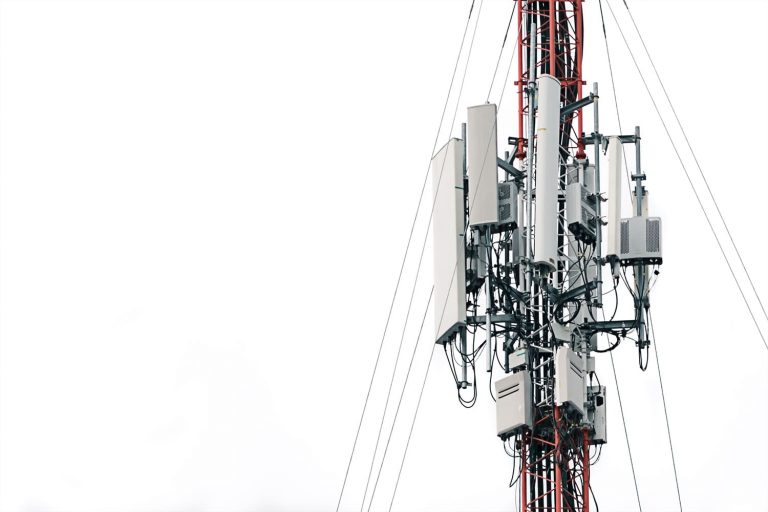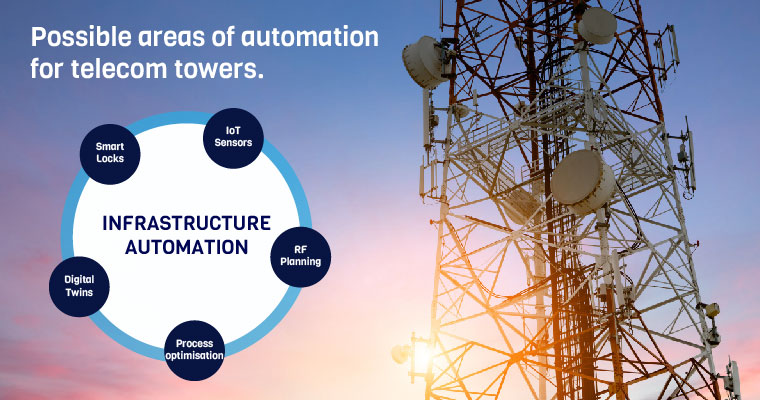- June 20, 2020
The Age of Tower Automation.
The era of automation is running across all industries. The Fourth Industrial Revolution is in full display and with it come wonderful opportunities for telecom towers and MNOs, leveraging some of the most disruptive and cutting-edge technologies. Yes, we are talking about 5G, AI and IoT.
In this article, we’ll see how telcos are preparing for this new stage in their road to digital transformation and the many ways automation of telecom infrastructure is here to help them lead the future of the industry.

What is automation in telecom
Automation is playing a key role in the telecom industry, laying the groundwork for more innovation, improved efficiency, sustained success and a greener environment. It is also at the core of the industry.
Experts have argued that automation has always been a part of this industry, but the current transformation phase is unveiling an era in which changes are far more significant, with greater consequences.
As such, automation in the telco industry heavily intertwines with Business Intelligence, as companies – especially in telecommunications – need to turn the business logic around, understand and anticipate the needs of customers as well as other stakeholders. We have already discussed the importance of BI in the Digital Era, which is becoming increasingly critical and key to the successful digital transformation of the industry.
Intelligence and programmability are the two automation ingredients. Intelligence needs to be smart to drive change; programmability needs to be powerful enough to coordinate responses and adaptations.
The Age of Tower Automation is here.
When we narrow the focus of our analysis, we’ll find that telecom infrastructure has fallen behind on innovation and applied technology, revealing the need for more efficient, automated operations to manage telecom assets.
Let’s explore the ways that the automation of telecom infrastructure can help the industry.

Infrastructure automation in telco means building a better, faster and scalable version of the traditional way to run the telecom business; it’s applying technology as more than a mere tool for replacing manual operations; it’s placing the customer and the environment at the core of its purpose; and it’s also not an option. Here’s why:
With a desire for tailored and on-demand service expectations, the need of seamless, never-ending connectivity, increased competition and corporate accountability, automation has become mandatory for the telecom industry.
How automation of infrastructures can help the telecom industry.
We are living the age of Telecom Network Automation (Deloitte, 2018) so it will be a matter of time before telcos and operators embrace the AI environment completely.
When we say automation, it’s most likely we are thinking of software-related operations like network management, sales and billing. However, few are discussing powering automation for telecom infrastructure such as field service operations and tower maintenance tasks.
Automating telecom infrastructure brings a numerous amount of benefits that range from operational efficiency to enhanced customer experience, that – of course – require investment and effort in change management, to show for the added value of automation.
Benefits of automating telecom infrastructure.
Our friends at Atrebo have gathered the word of several experts and as part of their own research, have come up with these five benefits of telecom tower automation.
Efficient data flow
Automation can process information at a much higher rate than traditional processes, and do so from a wide range of sources, improving the analytical capacity of the company.
If the telco industry is smart enough to combine automation with strategies for a successful digital transformation that include, for instance, business intelligence, they are certainly looking at great results.
Predictive maintenance
We know that taking care of massive cell towers is not an easy task. Providing 24/7/365 high-performing service is already hard enough.
Automation, and in this case, Internet of Things can help telcos deliver better network connection (and better service overall) by processing data with sophisticated algorithms and predict future behaviour based on historical data.
This way, operators can monitor the state of their assets and infrastructure, anticipate failure and fix problems in advance, namely cell towers, power lines or even a data center.
Companies like vHive use autonomous drones hive software and powerful analytics to digitize field assets for telecommunication companies, construction sites and even insurance.
Detect sources of waste
Reducing waste is as important as providing more and better services. With automation technology, operators can identify elements in their infrastructure that are being underused, unused or even overused to optimize their performance. Being able to measure the actual consumption of energy of any infrastructure and/or open field asset allows for a quick intervention to solve the problem. IoT innovators such as Everynet are already deploying their devices leading the digital transformation from low cost sensors that can generate new revenue streams and reduce costs.
This highly relates to the fact that there is room to grow, not so much on productive initiatives, but on the savings side of processes. There is potential for telcos to drastically reduce operational expenditure.
Increased asset security
Outdoor facilities, especially telecom infrastructures are often times extremely difficult to secure, since they lie in the open field and far away from headquarters. At the same time, their value in terms of customer experience and quality of service, increases by the day, with tons of devices connected to the network.
With the help of automation and Bluetooth technology, companies can have full fraud-proof control of their assets and increase the protection of their equipment, all while preventing vandalism with wireless devices and real-time alerts and notifications. Our partner Outlocks specializes in this type of security solutions for industries with critical assets located in the open field.
Find new sources of revenue
We know it all comes down to sales, income and revenue. Automating telco infrastructure can help companies develop a data-driven business model that runs on innovative, top-level technology that fuels the digital transformation.
Ultimately, enhanced services, optimized operations and automated, scalable customer experience management, can drive telcos to an increased market share, while reducing cost, energy and waste, thus improving the revenue per user sustainably.



